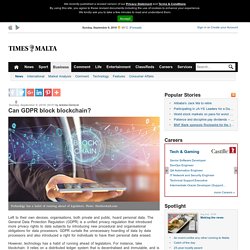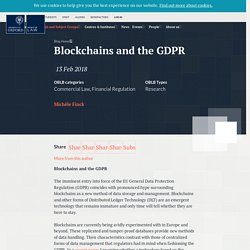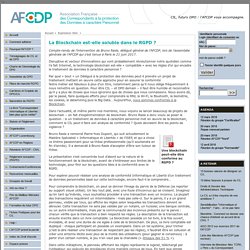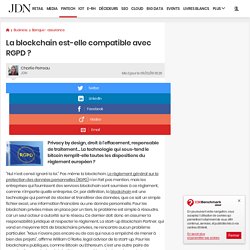

What do AI and blockchain mean for the rule of law? Can GDPR block blockchain? Technology has a habit of running ahead of legislators.

Photo: Shutterstock.com Left to their own devices, organisations, both private and public, hoard personal data. The General Data Protection Regulation (GDPR) is a unified privacy regulation that introduced more privacy rights to data subjects by introducing new procedural and organisational obligations for data processors.
GDPR curtails the unnecessary hoarding of data by data processors and also introduced a right for individuals to have their personal data erased. However, technology has a habit of running ahead of legislators. Anne Toth, head of Data Policy at the World Economic Forum, contends that because data stored on the blockchain, including personal data, cannot be deleted, there is no way to exercise “the right of erasure” that people are granted under GDPR. Crypto-currencies and GDPR. Thenextweb. When an enforceable right meets an immutable ledger, it looks like a textbook clash of law and technology.
On the one hand, we have the General Data Protection Regulation laws (GDPR), which aims to give people a say in how information about them is processed. For example, individuals have the right to request that their personal data is corrected or deleted. On the other hand, we have blockchain – a technology that creates what some call an “immutable” ledger. By combining cryptography and distribution, blockchain makes it very difficult to alter or delete any information stored “on the chain.” So GDPR and blockchain start from incompatible assumptions about data integrity. What happens when the two meet? Blockchain technology is on a collision course with EU privacy law.
Those who have heard of "blockchain" technology generally know it as the underpinning of the Bitcoin virtual currency, but there are myriad organizations planning different kinds of applications for it: executing contracts, modernizing land registries, even providing new systems for identity management. There's one huge problem on the horizon, though: European privacy law. The bloc's General Data Protection law, which will come into effect in a few months' time, says people must be able to demand that their personal data is rectified or deleted under many circumstances.
A blockchain is essentially a growing, shared record of past activity that's distributed across many computers, and the whole point is that this chain of transactions (or other fragments of information) is in practice unchangeable – this is what ensures the reliability of the information stored in the blockchain. For blockchain projects that involve the storage of personal data, these two facts do not mix well. Blockchains and the GDPR. Blockchains and the GDPR The imminent entry into force of the EU General Data Protection Regulation (GDPR) coincides with pronounced hype surrounding blockchains as a new method of data storage and management.

Blockchains and other forms of Distributed Ledger Technology (DLT) are an emergent technology that remains immature and only time will tell whether they are here to stay. Blockchains are currently being avidly experimented with in Europe and beyond. These replicated and tamper-proof databases provide new methods of data handling. Blockchain Roundup - A guide to ILTA & Non-ILTA Blockchain content - ILTA.
La Blockchain est-elle soluble dans le RGPD ? - Association Française des Correspondants aux Données Personnelles. Compte-rendu de l’intervention de Bruno Rasle, délégué général de l’AFCDP, lors de l’assemblée générale de l’AFCDP qui s’est tenue à Paris le 21 juin 2017.

Disruptive et vecteur d’innovations qui vont probablement révolutionner notre quotidien comme l’a fait Internet, la technologie blockchain est-elle « compatible » avec les règles d’or qui encadre le traitement de données à caractère personnel ? Par quel « bout » un Délégué à la protection des données peut-il prendre un projet de traitement mettant en œuvre cette approche pour en assurer la conformité Notre métier est fabuleux à plus d’un titre, notamment parce qu’il nous oblige fréquemment à nous remettre en question.
Pour être CIL – et DPO demain – il faut être humble et reconnaître qu’il y a plus de choses que nous ignorons que de choses que nous connaissons. Dans l’actualité, et même parmi nos membres, nous voyons se lancer beaucoup de projets de blockchain – en fait d’expérimentation de blockchain. Signer (authentifier) ; 1798 ai event final report 15 11 2017 002. Www.journaldunet. Privacy by design, droit à l'effacement, responsable de traitement… La technologie qui sous-tend le bitcoin remplit-elle toutes les dispositions du règlement européen ?

"Nul n'est censé ignoré la loi. " Pas même la blockchain. Le règlement général sur la protection des données personnelles (RGPD) n'en fait pas mention, mais les entreprises qui fournissent des services blockchain sont soumises à ce règlement, comme n'importe quelle entreprise. Or, par définition, la blockchain est une technologie qui permet de stocker et transférer des données, que ce soit un simple fichier excel, une information financière ou une donnée personnelle.
Pour les blockchain privées mises en place par un tiers, le problème est simple à résoudre, car un seul acteur a autorité sur le réseau. Le responsable du traitement : incompatible.